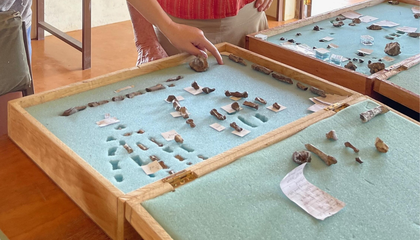Research has unveiled a significant fossil find that may change our understanding of ancient hominins. A fossilized hand, linked to the species P. Boisei, suggests that this extinct human relative might have possessed the capability to use tools, a trait once thought to be exclusive to our own lineage.
The study, conducted by a team at the University of Kent, highlights a fossilized hand dating back approximately 1.8 million years. Discovered in Olduvai Gorge, Tanzania, this remarkable find provides new insights into the behaviors of early human relatives. The hand exhibits features that indicate a potential for tool-making and manipulation, challenging previous assumptions about the cognitive abilities of P. Boisei.
This discovery is pivotal as it sheds light on the evolutionary history of tool use. Dr. James B. Harcourt, the lead researcher on the study, emphasized the importance of this finding. He stated, “The anatomical features of the hand suggest that P. Boisei could have used tools, which implies a more complex behavioral repertoire than previously recognized.”
The implications of this research extend beyond the fossil itself. It raises questions about the interactions between different hominin species and their respective capabilities. Previous beliefs held that only early members of the genus Homo were capable of creating and using tools. The new evidence indicates that P. Boisei, known primarily for its robust cranial features and dietary adaptations, may have had a more intricate social and cultural life.
The fossil was uncovered during excavations in a region renowned for its rich archaeological significance. Olduvai Gorge has long been a critical site for understanding human evolution, yielding numerous hominin fossils over the decades. This latest find adds to the wealth of evidence that continues to reshape our understanding of human ancestry.
As researchers continue to analyze the fossil, they hope to glean further insights into the lifestyle and environment of P. Boisei. The study not only highlights the importance of fossil discoveries but also underscores the evolving nature of our understanding of early human relatives.
In light of these findings, the scientific community is encouraged to reassess the role of tool use in the survival and adaptation of ancient species. As Dr. Harcourt noted, “This discovery invites us to rethink what we know about the capabilities of our ancestors and their relatives.”
As research progresses, the fossilized hand of P. Boisei stands as a testament to the mysteries still waiting to be uncovered in our evolutionary past.







